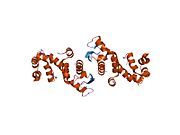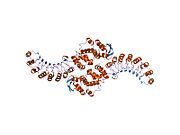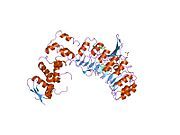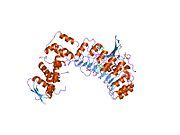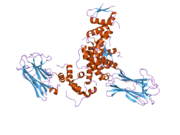S-phase kinase-associated protein 1
S-phase kinase-associated protein 1 is an enzyme that in humans is encoded by the SKP1 gene.[5][6][7]
This gene encodes a protein that is a member of the SCF ubiquitin ligase protein complex. It binds to F-box proteins (proteins containing an F-box motif), such as cyclin F, S-phase kinase-associated protein 2, and other regulatory proteins involved in ubiquitin dependent proteolysis.[8] The encoded protein also collaborates with a network of proteins to control beta-catenin levels and affects the activity level of beta-catenin dependent TCF transcription factors. Studies have also characterized the protein as an RNA polymerase II elongation factor. Alternative splicing of this gene results in two transcript variants. A related pseudogene has been identified on chromosome 7.
Interactions
[edit]SKP1A has been shown to interact with:
References
[edit]- ^ a b c GRCh38: Ensembl release 89: ENSG00000113558 – Ensembl, May 2017
- ^ a b c GRCm38: Ensembl release 89: ENSMUSG00000036309 – Ensembl, May 2017
- ^ "Human PubMed Reference:". National Center for Biotechnology Information, U.S. National Library of Medicine.
- ^ "Mouse PubMed Reference:". National Center for Biotechnology Information, U.S. National Library of Medicine.
- ^ Zhang H, Kobayashi R, Galaktionov K, Beach D (October 1995). "p19Skp1 and p45Skp2 are essential elements of the cyclin A-CDK2 S phase kinase". Cell. 82 (6): 915–25. doi:10.1016/0092-8674(95)90271-6. PMID 7553852. S2CID 16325791.
- ^ Demetrick DJ, Zhang H, Beach DH (July 1996). "Chromosomal mapping of the genes for the human CDK2/cyclin A-associated proteins p19 (SKP1A and SKP1B) and p45 (SKP2)". Cytogenet Cell Genet. 73 (1–2): 104–7. doi:10.1159/000134318. PMID 8646875.
- ^ "Entrez Gene: SKP1A S-phase kinase-associated protein 1A (p19A)".
- ^ Bai C, Sen P, Hofmann K, Ma L, Goebl M, Harper JW, Elledge SJ (1996). "SKP1 connects cell cycle regulators to the ubiquitin proteolysis machinery through a novel motif, the F-box". Cell. 86 (2): 263–74. doi:10.1016/S0092-8674(00)80098-7. PMID 8706131. S2CID 18387009.
- ^ a b c d e f g Cenciarelli C, Chiaur DS, Guardavaccaro D, Parks W, Vidal M, Pagano M (October 1999). "Identification of a family of human F-box proteins". Curr. Biol. 9 (20): 1177–9. Bibcode:1999CBio....9.1177C. doi:10.1016/S0960-9822(00)80020-2. PMID 10531035. S2CID 7467493.
- ^ a b c Min KW, Hwang JW, Lee JS, Park Y, Tamura TA, Yoon JB (May 2003). "TIP120A associates with cullins and modulates ubiquitin ligase activity". J. Biol. Chem. 278 (18): 15905–10. doi:10.1074/jbc.M213070200. PMID 12609982.
- ^ a b Strack P, Caligiuri M, Pelletier M, Boisclair M, Theodoras A, Beer-Romero P, Glass S, Parsons T, Copeland RA, Auger KR, Benfield P, Brizuela L, Rolfe M (July 2000). "SCF(beta-TRCP) and phosphorylation dependent ubiquitinationof I kappa B alpha catalyzed by Ubc3 and Ubc4". Oncogene. 19 (31): 3529–36. doi:10.1038/sj.onc.1203647. PMID 10918611. S2CID 24267499.
- ^ Suzuki H, Chiba T, Suzuki T, Fujita T, Ikenoue T, Omata M, Furuichi K, Shikama H, Tanaka K (January 2000). "Homodimer of two F-box proteins betaTrCP1 or betaTrCP2 binds to IkappaBalpha for signal-dependent ubiquitination". J. Biol. Chem. 275 (4): 2877–84. doi:10.1074/jbc.275.4.2877. PMID 10644755.
- ^ Margottin F, Bour SP, Durand H, Selig L, Benichou S, Richard V, Thomas D, Strebel K, Benarous R (March 1998). "A novel human WD protein, h-beta TrCp, that interacts with HIV-1 Vpu connects CD4 to the ER degradation pathway through an F-box motif". Mol. Cell. 1 (4): 565–74. doi:10.1016/s1097-2765(00)80056-8. PMID 9660940.
- ^ Matsuzawa SI, Reed JC (May 2001). "Siah-1, SIP, and Ebi collaborate in a novel pathway for beta-catenin degradation linked to p53 responses". Mol. Cell. 7 (5): 915–26. doi:10.1016/s1097-2765(01)00242-8. PMID 11389839.
- ^ Ayad NG, Rankin S, Murakami M, Jebanathirajah J, Gygi S, Kirschner MW (April 2003). "Tome-1, a trigger of mitotic entry, is degraded during G1 via the APC". Cell. 113 (1): 101–13. CiteSeerX 10.1.1.522.1877. doi:10.1016/s0092-8674(03)00232-0. PMID 12679038. S2CID 14962502.
- ^ Kiernan RE, Emiliani S, Nakayama K, Castro A, Labbé JC, Lorca T, Nakayama Ki K, Benkirane M (Dec 2001). "Interaction between cyclin T1 and SCF(SKP2) targets CDK9 for ubiquitination and degradation by the proteasome". Mol. Cell. Biol. 21 (23): 7956–70. doi:10.1128/MCB.21.23.7956-7970.2001. PMC 99964. PMID 11689688.
- ^ a b Staropoli JF, McDermott C, Martinat C, Schulman B, Demireva E, Abeliovich A (March 2003). "Parkin is a component of an SCF-like ubiquitin ligase complex and protects postmitotic neurons from kainate excitotoxicity". Neuron. 37 (5): 735–49. doi:10.1016/s0896-6273(03)00084-9. PMID 12628165. S2CID 17024826.
- ^ Lisztwan J, Marti A, Sutterlüty H, Gstaiger M, Wirbelauer C, Krek W (January 1998). "Association of human CUL-1 and ubiquitin-conjugating enzyme CDC34 with the F-box protein p45(SKP2): evidence for evolutionary conservation in the subunit composition of the CDC34-SCF pathway". EMBO J. 17 (2): 368–83. doi:10.1093/emboj/17.2.368. PMC 1170388. PMID 9430629.
- ^ Zheng N, Schulman BA, Song L, Miller JJ, Jeffrey PD, Wang P, Chu C, Koepp DM, Elledge SJ, Pagano M, Conaway RC, Conaway JW, Harper JW, Pavletich NP (April 2002). "Structure of the Cul1-Rbx1-Skp1-F boxSkp2 SCF ubiquitin ligase complex". Nature. 416 (6882): 703–9. Bibcode:2002Natur.416..703Z. doi:10.1038/416703a. PMID 11961546. S2CID 4423882.
- ^ Ohta T, Michel JJ, Schottelius AJ, Xiong Y (April 1999). "ROC1, a homolog of APC11, represents a family of cullin partners with an associated ubiquitin ligase activity". Mol. Cell. 3 (4): 535–41. doi:10.1016/s1097-2765(00)80482-7. PMID 10230407. S2CID 19371828.
- ^ Ewing RM, Chu P, Elisma F, Li H, Taylor P, Climie S, McBroom-Cerajewski L, Robinson MD, O'Connor L, Li M, Taylor R, Dharsee M, Ho Y, Heilbut A, Moore L, Zhang S, Ornatsky O, Bukhman YV, Ethier M, Sheng Y, Vasilescu J, Abu-Farha M, Lambert JP, Duewel HS, Stewart II, Kuehl B, Hogue K, Colwill K, Gladwish K, Muskat B, Kinach R, Adams SL, Moran MF, Morin GB, Topaloglou T, Figeys D (2007). "Large-scale mapping of human protein-protein interactions by mass spectrometry". Mol. Syst. Biol. 3: 89. doi:10.1038/msb4100134. PMC 1847948. PMID 17353931.
- ^ Wu G, Lyapina S, Das I, Li J, Gurney M, Pauley A, Chui I, Deshaies RJ, Kitajewski J (November 2001). "SEL-10 is an inhibitor of notch signaling that targets notch for ubiquitin-mediated protein degradation". Mol. Cell. Biol. 21 (21): 7403–15. doi:10.1128/MCB.21.21.7403-7415.2001. PMC 99913. PMID 11585921.
- ^ Ng RW, Arooz T, Yam CH, Chan IW, Lau AW, Poon RY (November 1998). "Characterization of the cullin and F-box protein partner Skp1". FEBS Lett. 438 (3): 183–9. doi:10.1016/s0014-5793(98)01299-x. PMID 9827542. S2CID 40950881.
- ^ Schulman BA, Carrano AC, Jeffrey PD, Bowen Z, Kinnucan ER, Finnin MS, Elledge SJ, Harper JW, Pagano M, Pavletich NP (November 2000). "Insights into SCF ubiquitin ligases from the structure of the Skp1-Skp2 complex". Nature. 408 (6810): 381–6. Bibcode:2000Natur.408..381S. doi:10.1038/35042620. PMID 11099048. S2CID 4300503.
- ^ Marti A, Wirbelauer C, Scheffner M, Krek W (May 1999). "Interaction between ubiquitin-protein ligase SCFSKP2 and E2F-1 underlies the regulation of E2F-1 degradation". Nat. Cell Biol. 1 (1): 14–9. doi:10.1038/8984. PMID 10559858. S2CID 8884226.
Further reading
[edit]- Chen H, Thalmann I, Adams JC, Avraham KB, Copeland NG, Jenkins NA, Beier DR, Corey DP, Thalmann R, Duyk GM (1995). "cDNA cloning, tissue distribution, and chromosomal localization of Ocp2, a gene encoding a putative transcription-associated factor predominantly expressed in the auditory organs". Genomics. 27 (3): 389–98. doi:10.1006/geno.1995.1068. PMID 7558018.
- Sowden J, Morrison K, Schofield J, Putt W, Edwards Y (1996). "A novel cDNA with homology to an RNA polymerase II elongation factor maps to human chromosome 5q31 (TCEB1L) and to mouse chromosome 11 (Tceb1l)". Genomics. 29 (1): 145–51. doi:10.1006/geno.1995.1225. PMID 8530064.
- Bai C, Sen P, Hofmann K, Ma L, Goebl M, Harper JW, Elledge SJ (1996). "SKP1 connects cell cycle regulators to the ubiquitin proteolysis machinery through a novel motif, the F-box". Cell. 86 (2): 263–74. doi:10.1016/S0092-8674(00)80098-7. PMID 8706131. S2CID 18387009.
- Brown KA, Leek JP, Lench NJ, Moynihan LM, Markham AF, Mueller RF (1996). "Human sequences homologous to the gene for the cochlear protein Ocp-II do not map to currently known non-syndromic hearing loss loci". Ann. Hum. Genet. 60 (Pt 5): 385–9. doi:10.1111/j.1469-1809.1996.tb00436.x. PMID 8912791. S2CID 7687393.
- Liang Y, Chen H, Asher JH, Chang CC, Friedman TB (1997). "Human inner ear OCP2 cDNA maps to 5q22-5q35.2 with related sequences on chromosomes 4p16.2-4p14, 5p13-5q22, 7pter-q22, 10 and 12p13-12qter". Gene. 184 (2): 163–7. doi:10.1016/S0378-1119(96)00590-2. PMID 9031623.
- Lisztwan J, Marti A, Sutterlüty H, Gstaiger M, Wirbelauer C, Krek W (1998). "Association of human CUL-1 and ubiquitin-conjugating enzyme CDC34 with the F-box protein p45(SKP2): evidence for evolutionary conservation in the subunit composition of the CDC34-SCF pathway". EMBO J. 17 (2): 368–83. doi:10.1093/emboj/17.2.368. PMC 1170388. PMID 9430629.
- Ng RW, Arooz T, Yam CH, Chan IW, Lau AW, Poon RY (1998). "Characterization of the cullin and F-box protein partner Skp1". FEBS Lett. 438 (3): 183–9. doi:10.1016/S0014-5793(98)01299-X. PMID 9827542. S2CID 40950881.
- Yam CH, Ng RW, Siu WY, Lau AW, Poon RY (1999). "Regulation of cyclin A-Cdk2 by SCF component Skp1 and F-box protein Skp2". Mol. Cell. Biol. 19 (1): 635–45. doi:10.1128/mcb.19.1.635. PMC 83921. PMID 9858587.
- Henzl MT, Thalmann I, Thalmann R (1999). "OCP2 exists as a dimer in the organ of Corti". Hear. Res. 126 (1–2): 37–46. doi:10.1016/S0378-5955(98)00148-8. PMID 9872132. S2CID 20953392.
- Winston JT, Strack P, Beer-Romero P, Chu CY, Elledge SJ, Harper JW (1999). "The SCFbeta-TRCP-ubiquitin ligase complex associates specifically with phosphorylated destruction motifs in IkappaBalpha and beta-catenin and stimulates IkappaBalpha ubiquitination in vitro". Genes Dev. 13 (3): 270–83. doi:10.1101/gad.13.3.270. PMC 316433. PMID 9990852.
- Ilyin GP, Rialland M, Glaise D, Guguen-Guillouzo C (1999). "Identification of a novel Skp2-like mammalian protein containing F-box and leucine-rich repeats". FEBS Lett. 459 (1): 75–9. doi:10.1016/S0014-5793(99)01211-9. PMID 10508920. S2CID 22945082.
- Cenciarelli C, Chiaur DS, Guardavaccaro D, Parks W, Vidal M, Pagano M (1999). "Identification of a family of human F-box proteins". Curr. Biol. 9 (20): 1177–9. Bibcode:1999CBio....9.1177C. doi:10.1016/S0960-9822(00)80020-2. PMID 10531035. S2CID 7467493.
- Winston JT, Koepp DM, Zhu C, Elledge SJ, Harper JW (1999). "A family of mammalian F-box proteins". Curr. Biol. 9 (20): 1180–2. Bibcode:1999CBio....9.1180W. doi:10.1016/S0960-9822(00)80021-4. PMID 10531037. S2CID 14341845.
- Suzuki H, Chiba T, Suzuki T, Fujita T, Ikenoue T, Omata M, Furuichi K, Shikama H, Tanaka K (2000). "Homodimer of two F-box proteins betaTrCP1 or betaTrCP2 binds to IkappaBalpha for signal-dependent ubiquitination". J. Biol. Chem. 275 (4): 2877–84. doi:10.1074/jbc.275.4.2877. PMID 10644755.
- Read MA, Brownell JE, Gladysheva TB, Hottelet M, Parent LA, Coggins MB, Pierce JW, Podust VN, Luo RS, Chau V, Palombella VJ (2000). "Nedd8 modification of cul-1 activates SCF(beta(TrCP))-dependent ubiquitination of IkappaBalpha". Mol. Cell. Biol. 20 (7): 2326–33. doi:10.1128/MCB.20.7.2326-2333.2000. PMC 85397. PMID 10713156.
- Schulman BA, Carrano AC, Jeffrey PD, Bowen Z, Kinnucan ER, Finnin MS, Elledge SJ, Harper JW, Pagano M, Pavletich NP (2000). "Insights into SCF ubiquitin ligases from the structure of the Skp1-Skp2 complex". Nature. 408 (6810): 381–6. Bibcode:2000Natur.408..381S. doi:10.1038/35042620. PMID 11099048. S2CID 4300503.
- Lyapina S, Cope G, Shevchenko A, Serino G, Tsuge T, Zhou C, Wolf DA, Wei N, Shevchenko A, Deshaies RJ (2001). "Promotion of NEDD-CUL1 conjugate cleavage by COP9 signalosome". Science. 292 (5520): 1382–5. Bibcode:2001Sci...292.1382L. doi:10.1126/science.1059780. PMID 11337588. S2CID 14224920.
- Fukuchi M, Imamura T, Chiba T, Ebisawa T, Kawabata M, Tanaka K, Miyazono K (2001). "Ligand-dependent degradation of Smad3 by a ubiquitin ligase complex of ROC1 and associated proteins". Mol. Biol. Cell. 12 (5): 1431–43. doi:10.1091/mbc.12.5.1431. PMC 34595. PMID 11359933.









